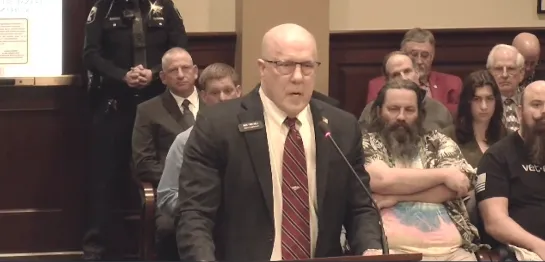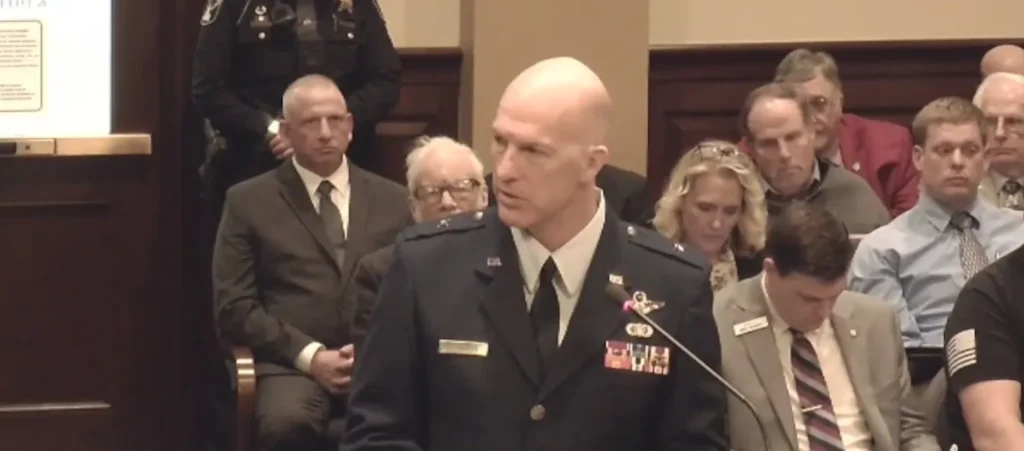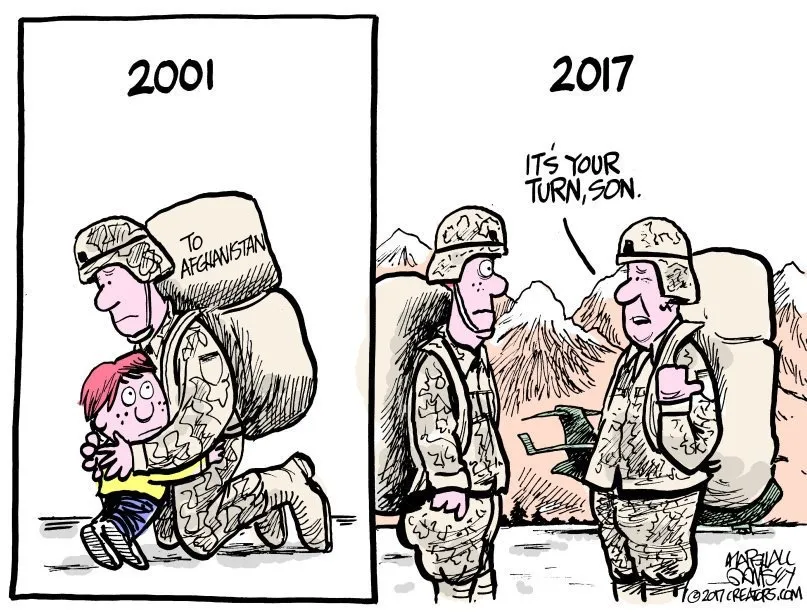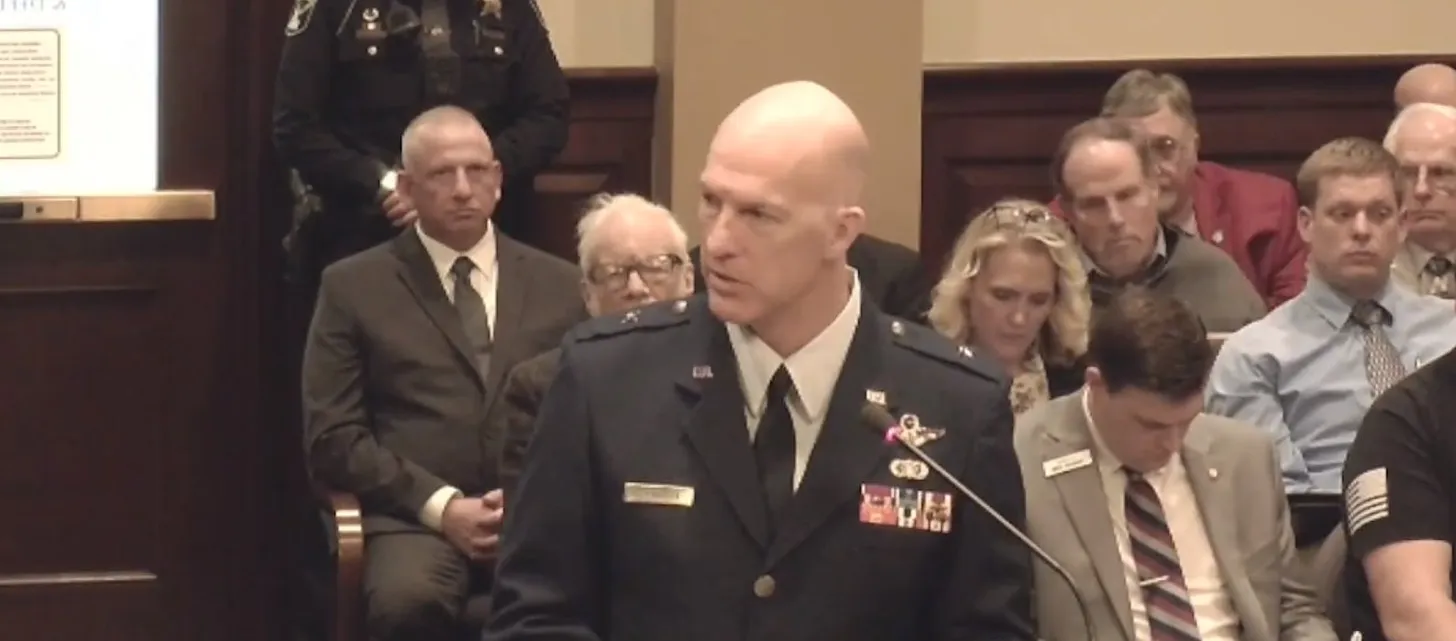On Monday afternoon, members of the military/industrial complex filled a Capitol hearing room to testify in favor of the military/industrial complex. Senate Bill 1252, the Defend the Guard Act, was once again before the House Transportation & Defense Committee. Three years ago the same bill failed in that very room when Chairman Joe Palmer gaveled out despite a majority seeming to have voted in favor.
On Monday, S1252 came in having already passed on the Senate floor. Rep. Ted Hill and Sen. Ben Adams laid out the reasons for supporting this legislation. They assured the committee that it would not impact federal funding of the Idaho National Guard, nor would it put their training at risk. Rather, the purpose was to retain state control of the Guard rather than allowing it to be used for the federal government’s numerous undeclared wars.


There was an obvious contrast between those who testified in favor of the bill and those who testified against. In favor of the bill were veterans, not only of the Idaho National Guard but of the US Army and Marine Corps, men who had seen combat, who had seen friends die, who had come home carrying demons that impacted not only their own lives but their families, friends, and communities as well.

Testifying against the bill were union representatives and military brass. They warned the committee that passing this bill would indeed impact federal funding and equipment. Some even went so far as to say that not allowing Idaho’s guardsmen to deploy into combat in Syria, Afghanistan, or wherever they are being sent by the Pentagon lately, would impact their training and experience, making them less prepared to respond to natural disasters at home.

As many people pointed out during testimony and debate, the United States Congress has not declared war since 1942. Up until that time, war was a serious business that required the consent of our elected representatives. Congressmen and senators carefully weighed the reasons for engaging in war and the costs that it would bring to the American people.
Congress officially declared war in five separate conflicts in our history: the War of 1812, the Mexican-American War, the Spanish-American War, World War I, and World War II. Whether or not the decisions were correct in hindsight, there is no question that they were made by the people’s representatives.
The post-World War II system has been a different story. From 1945 through 2000, American soldiers shed their blood in Korea, Vietnam, Lebanon, Grenada, Iraq, and many more faraway places. Since 9/11, the US has been in a state of constant undeclared war for more than two decades, with thousands of American troops giving their lives in Afghanistan, Iraq, Syria, and more.
In the week after 9/11, Congress passed the Authorization for Use of Military Force against the terrorists who carried out that attack. Every attempt to repeal or sunset that resolution has failed, and four presidential administrations over the last 23 years have used it to justify continued military action throughout the world.
And for what? We went to war in Afghanistan in 2001 to root out Al Qaeda, but stayed there for twenty years hoping to build a stable democratic society in a place that had never known such a thing. We invaded Iraq in 2003 to eliminate weapons of mass destruction that may or may not have existed and to topple Saddam Hussein, but stayed there for many years after his execution.

Several veterans who testified on Monday explained that they began to question the purpose of their presence in these countries. Why were they fighting and dying so that one Afghan warlord could maintain power over another? Why were they risking their lives to protect the bacha bazi rape of Afghan boys?
It’s clear that the purpose of this endless state of undeclared war is to protect the system that is engaging in it. In 1960, President Dwight Eisenhower warned us about the military/industrial complex which he had helped create and foster. More than sixty years later, that complex is more powerful than ever.
The Cold War created a system wherein military leaders, arms manufacturers, and government bureaucrats always had an excuse to continually ask for ever more money and resources. If we ever cut spending, then not only would Americans lose their jobs, but the Russians would win. The end of the Cold War threatened this system, but the War on Terror gave it new life.
Our military leaders support this system, because the system supports them. Don’t look to the Pentagon for anyone brave enough to truly reform it, because they all depend on the system for their jobs. Officers who don’t support the system are not promoted, so the system actively selects for those who will promote its continence.
The Defend the Guard Act was to be a small way that Idaho could stand athwart history and say “stop!” It would have been a reminder that America is still a nation of laws, and that our highest law, the Constitution, gives sole authority for declaring war to Congress, not to the president or a massive unaccountable Executive Branch.
The Act would have been a reminder that the purpose of the Idaho National Guard is to protect Idaho, not deploy to the Middle East to fight one group of terrorists on behalf of another. Yet the military/industrial complex was unwilling to let that happen. They implored the committee to reject the bill, they pleaded, and they threatened, and in the end, the committee voted to kill S1252 rather than risk a vote on the floor.
Sen. Ben Adams gave this bill his all, cutting short a doctor visit to close debate. He said that he swore an oath, both as a Marine and a lawmaker, to support the Constitution, not the force structure of the US Armed Forces. He reminded the committee that our Founders deliberately gave Congress authority to declare war, not the president, because Americans are not ruled by a king. He pointed out that those opposing this bill were not elected representatives but unelected bureaucrats.
He closed by saying their job was to uphold the Constitution, not the status quo.
But the status quo won the day.
Paid subscribers head over to Substack for an informative bonus note. Not subscribed? Click here to fix that!
About Brian Almon
Brian Almon is the Editor of the Gem State Chronicle. He also serves as Chairman of the District 14 Republican Party and is a trustee of the Eagle Public Library Board. He lives with his wife and five children in Eagle.













